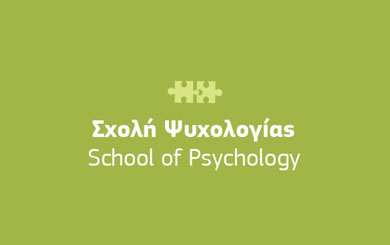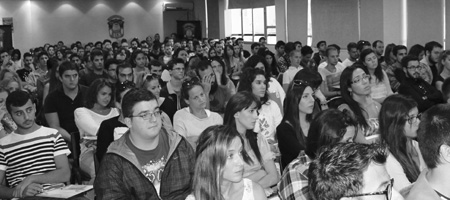

School of Psychology
- MSc Psychology of Addictions and Behavioural Change
- Professional Doctorate Counselling Psychology
- MSc Occupational Psychology
- MSc Forensic Psychology (with Psychotherapy)
- MSc Counselling and Psychology in Educational Settings
- MSc Applied Psychology: Health Psychology and Counselling
- MSc Applied Psychology: Clinical Psychology and Counselling
- MSc Integrative Counselling & Psychotherapy




BSc (Hons) Applied Psychology
-
40+ Years of Experience in Psychology Education.
-
Applied Psychology Programme with innovative content.
-
Meets the credentials for BPS (British Psychological Society) Registration.
-
Leads to a Psychologist Practitioner Status in Greece.

Course Information
The School of Psychology at Mediterranean College is widely renowned as the leader in Greece, with over forty years of experience, in the provision of high quality University courses in Psychology. The BSc (Hons) Applied Psychology programme has been designed by the University of Derby, a TOP30 UK University. The academic content of the programme is in accordance to the requirements of the BPS (British Psychological Society), enabling graduates to apply for membership. The Psychology Programmes offered by Derby University are ranked 5th in the UK, according to the student’s satisfaction rating (Guardian University Guide 2020).
What you will study
Through this course you will familiarise yourself with all the recent research related to the social, developmental, cognitive and biological dimensions of human behaviour. You will also explore the applications of psychology as a science in a wide range of areas – from understanding the nature and causes of mental illness, to investigating the decision-making process in real-life conditions.
As a research-oriented programme, the content is constantly updated by our staff, who conduct cutting-edge research in their scientific fields. In this context, you will conduct your own research and participate in research projects of the College. You will also be trained in all modern software tools for designing, conducting, analysing and presenting quantitative and qualitative social sciences research.
Why choose this course
- The degree is awarded by the No1 Ranked UK University in Greece and TOP30 in the UK.
- It is the only Applied Psychology programme in Greece.
- You can either register with the BPS (British Psychological Society) and/ or obtain a license to practice as a psychologist in Greece.
- You become a bilingual professional, with exceptional academic and career prospects.
- The programme focuses on the clinical psychology field, while at the same time contains innovative modules, such as the “Psychology in the Modern World”.
- It covers Counseling & Psychotherapy, taught through role-plays and the use of a one-way mirror observation suite.
- You can always do your internship or your voluntary activity in a network of collaborating institutions.
- It is a research-oriented programme, which fosters your participation in conferences and academic journals’ publications.
The modules are carried out in semesters, while teaching and learning takes place in various ways: lectures, guest lectures, seminars, labs, tutorials, role-plays, presentations, supervision, independent learning. You’ll have a few written exams and you will be involved in more substantial assessment methods, such as essays, reports, presentations, portfolios and research.
Courses
Year 1
Introduction to Social and Cognitive Psychology
The Cognitive Psychology component of this module introduces students to cognitive psychology as a science. The aim is to provide students with a sound understanding of research into human cognition including areas such as perception, attention, language, memory and thinking, coupled with an awareness of applications of cognitive research to real-world scenarios. Within the Social Psychology component students will explore a range of basic social psychological theories that have been developed to explain our engagement with others such as how attitudes develop; how aggressive or altruistic behaviour can be explained; and how our identities influence the ways we view, and are viewed by, others.
Contemporary Issues in Comparative Psychology
This module provides students with an overview of a broad range of contemporary comparative issues in psychology. It will discuss both the theoretical basis and the current research evidence for a range of contemporary comparative psychology topics.
Historical and Critical Psychology
Students will be introducted to both historical and critical psychology. Students will explore the historical development of psychological thought and practice, which explores the role of the wider social, cultural and political context. The module will introduce students to what critical psychology is and how it differs from mainstream psychology. A range of key debates, theorists, research methods, studies and crises that make up psychology as a discipline will be addressed during the course of the module.
Introduction to Biological and Developmental Psychology
The Developmental Psychology component introduces students to concepts, theories and methods relevant to the study of child development. Students will be introduced to the area of developmental psychology, its historical development, the methods used by researchers working in this field and key debates such as what drives development? The research and theories proposed by key figures working in the areas of social and cognitive development will then be discussed. Within the Biological Psychology component students will explore how the brain works, including an introduction to the brain, neural structures and neurons. We will investigate whether parts of our brains serve specialised functions and if there are individual differences in brain structure, in particular associated with handedness. We will also investigate how our understanding of brain function informs our understanding of selected areas of cognition and behaviour.
Introduction to Research Methods in Psychology
The purpose of this module is to provide students with an introduction to the key principles underlying research methods in psychology. Students will be taught the need for systematic research methods and will explore the relationship between theory and data in both quantitative and qualitative research. Students will learn key principles in research design and will engage in the practical aspects of generating quantitative and qualitative research data. Students will learn how to analyse quantitative and qualitative data and how to report the findings of simple psychological studies in a standardised format.
Psychology of Wellbeing
The aim of this class is to introduce students to psychological approaches and applications to human wellbeing. The module introduces the idea of wellbeing and considers its contemporary meaning as well as a brief history of wellbeing in psychology. Both positive and negative aspects of individuals wellbeing and ‘normative’ states are discussed, with students being introduced to individual differences in emotion and mental health and their associated factors.. Consequences related to lack of wellbeing will also be explored as well as the application of psychological approaches to enhancing wellbeing.
Skills and Careers in Psychology I
This free standing module is a zero-credit module that is core for all psychology students and will be assessed using a pass/fail element. The module and assessment fulfils the Personal Development Planning (PDP) requirements of the programme for Level 4. It will provide students with academic, careers and employability support throughout the first year of their degree. The learning materials will cover skills within the graduate framework. A number of workshops will be offered to address fundamental skills required within the degree, such as basic essay writing techniques and assessment skills. Careers workshops will showcase the support services available, and encourage students to think about improving their employability. Not only will these enhance students’ academic development but they will also present skills that are transferable to a number of different contexts.
Intermediate English I
Students will develop their general English skills in reading, writing, listening and speaking, and be provided with an introduction to academic English. Students will develop their grammatical, phonological and general and subject specific lexical awareness. By the end of the module students’ language for academic study should be at a mid B2 on the CEFR equivalent to IELTS 5.5.
Year 2
Psychopathology
The module aims to develop in students a critical understanding of the main forms of mental illness from a psychological perspective. The module provides students with an understanding of the key features of a variety of disorders and examines the contribution psychological approaches make to the theories, research, diagnosis and treatment of abnormal behaviour.
Biological and Developmental Psychology
The Biological component of this module aims to provide students with a critical understanding of the relationship between brain functioning and behaviour. Students will examine the biological bases of a range of behaviours and will consider how research in biological psychology can contribute to the understanding of psychological function. This component of the module is delivered through a mix of lectures, seminars, workshops/online materials and activities, and discussion. The Developmental component of this module aims to further develop students’ understanding of psychological concepts, theories and methods relevant to the study of lifespan developmental psychology. During this section of the module students will explore a range of research relating to cognitive and social development throughout the lifespan and develop the skills needed to evaluate existing research. This component of the module may be delivered through a mix of lectures, seminars, workshops/online materials and activities, and discussion.
Individual Differences & Quantitative Methods
This module advances the concepts of quantitative research methods that were introduced to students at Level 4 using the study of individual differences. Students will be introduced to traditional areas and prominent thinkers in the areas of personality and intelligence theory, before moving onto more specific areas of psychology where the differences between individuals has been researched. Alongside this, students will learn how to design and conduct appropriate experimental and quasi-experimental investigations of a range of individual differences variables. They will also be introduced to elementary scale development for the testing of individual differences within psychology.
Qualitative Methods: The Individual in Society
This module introduces a range of qualitative methods used within contemporary psychology and explores the different insights these approaches bring to the area of individual differences. The module will be divided into sections which each introduce a different qualitative method. In addition, the underlying assumptions which inform psychological research into individual differences such as gender, identity, health and so on are examined. The range of philosophical orientations and methodological approaches covered in the module enables students to consider the ways in which the individual and their engagement with the social world can be explored from a qualitative perspective.
Social and Cognitive Psychology
This module will address key debates in cognitive and social psychology. The module will consider how we perceive and process information, how our cognitions help us make sense of our surroundings, how we interact with others and how those interactions are understood and managed. Teaching on the module will move from a consideration of psychology at an individual level with the focus on cognitive processes to social psychology in which the role of social contexts and processes is considered. In the social psychology sessions we will introduce a range of theories relating to social processes and explore social life as it is enacted in contemporary, everyday contexts. Within both cognitive and social psychology we will explore a range of theoretical and methodological perspectives and will demonstrate some of the contrasts and connections between these two approaches to psychology.
Psychology of Health
The module builds on and develops knowledge gained through the study of core psychology at levels 4 and its application to the study of health and illness. Health psychology is one of the fastest growing disciplines in psychology. This module will explore the key theoretical concepts that underpin the discipline and introduce students to the main models and theories that health psychologists use to explain the experience of health and illness and their links to other areas of psychology.
Skills and Careers in Psychology II
This free standing module is a zero-credit module that is core for all psychology students and will be assessed using a pass/fail element. The module and assessment fulfils the Personal Development Planning (PDP) requirements of the programme for Level 5. It will provide students with academic, careers and employability support throughout the second year of their degree. The learning materials will cover skills within the graduate framework. This module moves on from its level 4 predecessor, by building more advanced academic skills, such as critical thinking and advanced research methods. The careers workshops focus more specifically on career paths available and practical support. The module as a whole will focus on developing the student as a professional.
Intermediate English II
The module builds on Intermediate English 1 and further develops students’ general and academic English skills in reading, writing, listening and speaking. Students will be exposed to more advanced forms of academic English. Students will further develop their grammatical, phonological and general and subject specific lexical awareness. By the end of the module students’ language for academic study should be at a B2/B2+ on the CEFR equivalent to IELTS 6.0 or above.
Year 3
Addictive Behaviours
The module critically examines contemporary psychological approaches to the understanding of substance use and addiction. Students will consider the relative contributions of psychological theories from the fields of biological, behavioural, social and cognitive psychology to understanding, treatment and prevention of addictions, including those not involving consumption of substances.
Psychology of Illness
By taking this module students will develop a critical understanding of psychological concepts, theories, and methods relevant to the study of acute and chronic illness. The module will provide students with an understanding of the range of research conducted in this area, and with the skills necessary to evaluate existing research regarding the aetiology, progression, impact and/or management of ill health; applied to real-world settings across the lifespan.
Autism, Asperger’s & ADHD
This module introduces three major interrelated childhood developmental disorders. Students will be encouraged to consider the often fine-lines between Autistic Disorders, Asperger’s Disorder and the subtypes of Attention-Deficit/Hyperactivity Disorder. The module draws heavily on a wealth of fascinating research and theory but also considers the individual experience and characteristics of people with these diagnoses. Topics might covered include, social and communication impairment, theory of mind, weak central coherence theory and executive dysfunction, savant ability, behavioural and pharmacological treatment, classification, diagnosis and developmental outcomes. The module is presented in a series of lectures and seminars where students can develop an understanding of these conditions.
Clinical Applications of Psychology
The module builds on and develops knowledge gained through the study of core psychology at levels 4 and 5 and its application in an applied context. This module is designed to develop students’ understanding of the application of psychological theory and research in practice. The module will focus on the three professional areas of psychology (clinical, health and counselling) that are concerned with the psychological health and well-being of individuals. Students will be introduced to the generic skills required of psychologists working in these areas before exploring the application of psychological theory and research to understanding the psychological components of a range of clinically relevant topics. The use of psychologically-based assessments, interventions and therapies appropriate to specific populations and clinical issues will also be examined.
Independent Study in Psychology
This module represents the culmination of students’ training in psychological research methods, and allows students to put into practice research skills acquired at Levels 4 and 5. Under academic supervision, students identify a research issue in an area of psychology of their choosing, formulate meaningful research questions and/or hypotheses, select appropriate methods, collect and analyse empirical data, and write up the study in a scientific report. In addition, students prepare for graduate employment and/or postgraduate training by reflecting on and articulating the personal and transferable skills they have developed across their studies.
Admission Requirements
This course is ideal for you, if you are a high school graduate of any discipline with the necessary English language skills, who aspires to become a Psychologist, either with your own private practice or within an organisation.
The minimum English language requirement for the bilingual course (Greek and English) is equivalent to IELTS 4.5 (B1) and for the English-taught course is equivalent to IELTS 6.0 (B2). If you do not possess an official English language certificate, you can sit the College’s internal placement test.
Moreover, you’ll be asked to submit a reference letter from a tutor, and you’ll be called for an academic interview with the programme leader.
If you are a holder of an HND diploma or a University or College student in a relevant discipline, you may be granted advanced entry, through recognition of prior learning.
Application & Enrolment
We use a rolling admissions policy, so we accept applications throughout the calendar year until all available places are filled. Since this is one of the most popular courses at Mediterranean College, we urge you to submit your application in time.
We also offer multiple fee payment methods, individual payment plans and bursaries based on academic, athletic and socio-economic criteria.
Contact us today and find out more about this course and the available bursaries and funding opportunities. Our admissions advisors will provide you with all necessary information and will guide you though the application and enrolment process.
Degree recognition
The degree is recognised in Greece as professional equivalent to psychology degrees awarded by Greek state universities. This recognition process requires to apply for professional equivalence at the Ministry of Education (ATEEN department). The license to practice Psychology is then issued by the regional Municipal Authorities.
The content of this course meets the academic requirements of the BPS (British Psychological Society). This means that upon graduation, you may register with the BPS on an individual basis, through the international route. Should you choose to continue your studies towards a Master’s or a PhD and develop clinical experience, you will then have the opportunity to become a Chartered Psychologist in the UK.
Click here for more information on the degree recognition procedure by the Greek authorities.
Postgraduate study
A Psychology degree allows you to choose from a variety of postgraduate courses. You can continue for a Master’s degree in Psychology or pursue a more psychotherapeutic approach, in Greece or at overseas universities. At Mediterranean College you can choose:
- MSc Counselling and Psychology in Educational Settings
- MSc Applied Psychology: Clinical Psychology and Counselling
- MSc Applied Psychology: Health Psychology and Counselling
- MSc Integrative Counselling and Psychotherapy
- MSc Adult Cognitive Behavioural Psychotherapy
Alternatively, you can work in Human Resources departments in organistations, with the MSc Human Resources Management or train to become a Special Education Professional, with the MA Inclusion and Special Educational Needs and Disability (ISEND).
Career prospects
You can become a psychologist with your own private practice, or seek employment at:
- Various counselling settings, such as mental health centers, counselling stations, community support units, social welfare units
- Schools
- Hospitals and clinics
- Rehabilitation & reintegration centres
- Human Resource Management departments
- Business & market research agencies
- Research centers
- Centers for special education and special schools
- Humanitarian and developmental NGOs
Testimonials
At Mediterranean College I studied the BSc (Hons) Applied Psychology course, which offered me the necessary skills to be accepted for postgraduate studies in London (MSc Clinical Applications of Psychology – Kingston University London) and become a member of the British Psychological Society – MBPsS). Starting from scratch, the College and its outstanding academic tutors provided me the theoretical and practical background to be employed and continue to work until...
Spyros Vlaseros, BSc (Hons) Applied Psychology
I started my studies at Mediterranean College in 2008 when I followed the BSc in Psychology and Counselling course through the University of Teesside. Mediterranean College provided me with the foundation upon which I based my career. After completing the BSc, I moved to England, obtained two Master’s degrees and started working as a research assistant at the University of Teesside. I am completing now my final PhD year with...
Theodora Machaira, BSc (Hons) Psychological Sciences & Counselling
Completing the academic programme BSc in Counselling & Psychology at the Mediterranean College, I managed to register with the British Psychological Society as a Graduate Member, I have been working as an independent mental health professional with my private practice until today, Ι linked with other professionals in the Psychology and Mental Health field, I wrote two psychology books which have been officially published, and also, having an accredited (by...
Evangelos Kousiadis, BSc (Hons) Psychological Sciences & Counselling




